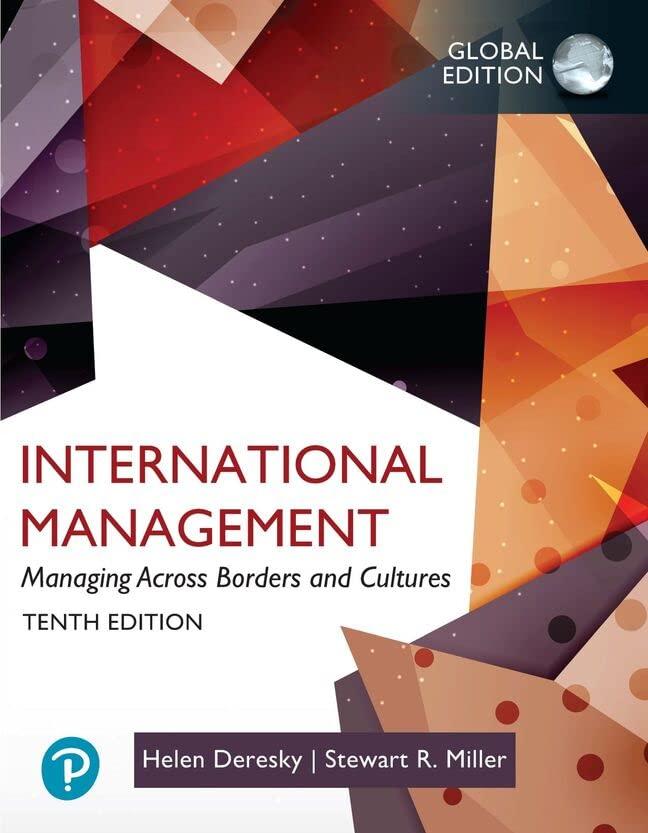The pleasant February morning had taken a perplexing turn for Anuj Pathak. He had reached the office
Question:
The pleasant February morning had taken a perplexing turn for Anuj Pathak. He had reached the office after a jog at the beach as had become his habit in the last few months in Mumbai. He had barely settled at his desk to review his schedule when the Vice President, HR, Gopalkrishna Pillai, had called him to his office.
Pillai had begun with a general question about how Pathak was settling in. “Quite well!” Pathak replied. “I am very confident about showing solid results at the earliest.” But Pillai had looked concerned, and said, “I’m not so sure. What I’m sensing is that people are quite unhappy with your style. I’m not mentioning any names, but some people from your department have even put in requests for transfers to other departments. They say you are standoffish and extremely critical. I am afraid that the lack of rapport with people around you will impact your performance.”
Anuj was shocked. “I have a strong track record of performance.
And I’m here to succeed! Of course, I know how essential it is to take people along and keep morale high,” he said. “We know your track record and have big expectations from you, but you need to reflect on your style,” said Pillai.
Pathak had been excited about returning to India and making a mark at Impact Finance Ltd. (IFL). He thought he had been settling in well but Pillai’s words had stopped him in his tracks. He came back to his office, feeling deflated and perplexed.
He couldn’t figure out where this was coming from. “I have consistently proven my leadership qualities and now my style is being questioned!” he thought. Everyone in the head office and in his own division team had seemed welcoming and friendly to him. But all of that seemed questionable now.
“Has it all been mere formality or simply duplicitous behaviour?
What have I missed?” He had always found clear and direct communication to be the most effective. “That is why I have been so upfront about my direct style and my democratic way of functioning and involving everyone in decision making.
I have not insisted on hierarchy when it comes to objective thrashing out of ideas. I have been very specific in spelling out the targets and have given clear and explicit feedback so as to get the best out of each person. This is how I have always got the best work out of people and delivered results. Why has it led to such a state now?” What really upset him was the charge of being unfriendly and critical. “If this was true, why would I have had an open door policy, tried to learn their names, and encouraged clear communication?” he wondered.
He was baffled by what he could only think of as the strange reaction of people at IFL. He had been slowly realising that settling back in his own country was harder than he had expected it to be. “But it shouldn’t be so different on the professional front! After all, the ways to get results are not affected by geography. And professionals everywhere should have the same standards!” he thought. Was his dream of a successful career back in India going to be shattered or could he recover and improve the situation?
Coming Home When, as an ambitious young man of 22, Pathak had left in June 1997 for postgraduate studies at Monash University in Melbourne, he had not imagined he would become an expatriate for nearly twenty years. After completing the programme, he had been thrilled to get his first job with a financial consultancy firm in Singapore. Within about four years he moved to a large MNC in the US. Except for about two years with a start-up in the Financial Services sector, he had worked at strategy consultancy firms. He had been thinking off and on of returning to India and had now decided to do so for both personal and professional reasons. In his visits prior to deciding on the move, he had caught up with Chandrashekhar, his old senior in college back in Bhopal, who was now a Managing Director at the Impact Group. Chandrashekhar had given him a glowing picture of the boom in the Indian economy and the developments in the financial services segment, especially the vast potential of the private sector. Pathak’s brother-in-law who worked in one of the new private sector banks in Mumbai had also given him a thumbs-up, speaking highly of the opportunities in India............
Question Develop a written report analyzing the situation, identifying the problem, and answering the questions:
1. What could Pathak have done differently?
2. What could the company have done differently?
3. How can the situation be improved now?
Step by Step Answer:

International Management Managing Across Borders And Cultures
ISBN: 9781292430362
10th Global Edition
Authors: Helen Deresky





